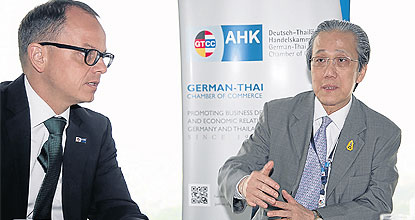
Addressing the shortage of skilled technicians, infrastructure links with neighbouring countries and energy security are crucial for Thailand to ensure the country maximises the benefits from the upcoming Asean Economic Community (AEC), says the German-Thai Chamber of Commerce (GTCC).

Phongsakdi Chakshuvej, president of the German-Thai Chamber (right), speaks with executive director Jorg Buck. Kosol Nakachol
While political unrest has not stopped German investors coming to Thailand, the GTCC survey last year found that the dearth of skilled technicians is the major concern for its members, said the new president Phongsakdi Chakshuvej.
As one of the major European investors in Thailand, Germany submitted 23 projects worth 3.19 billion baht to the Board of Investment (BoI) last year. In the first two months of this year, two projects worth 183 million baht applied for investment incentive approval, according to the BoI.
The GTCC reported Germany was Thailand's top European trading partner with bilateral trade of around US$10 billion last year. In the first two months, Thai exports to Germany rose 13% year-on-year to $684.5 million.
German exports to Asean are worth more than 20 billion euros (890 trillion baht), nearly double that to India, while shipments to Japan total 15 billion euros.
But Mr Phongsakdi, who took office last month, said raising the supply of skilled technicians is vital to boosting the partnership between Thailand and Germany.
According to the Office of Vocational Education Commission (OVEC), Thailand produces around 40,000 technicians a year for all segments.
But the Federation of Thai Industries and the Thai Chamber of Commerce claim that 200,000 technicians are required over five years from now, or 40,000 a year, for 14 strategic industries that the two organisations look after.
"We've had a problem with a skilled technician shortage for many years. Thailand has to move from labour-intensive production to more innovative with higher efficiency and productivity, and we need technicians to support these developments," Mr Phongsakdi said.
"To attract new investors you have to have manpower to support it. Otherwise, they have to look somewhere else," Mr Phongsaksi told Bangkok Post.
With over 500 members, GTCC is one of the largest foreign chambers of commerce in Thailand.
Despite the political unrest, Volkswagen, one of Germany's largest companies, recently confirmed its intention to expand its presence in Thailand.
"This is not the first time political unrest has happened in Thailand. None of the unrest creates a crisis for the economy. It comes and goes but business has to continue," said Mr Phongsakdi, also an executive of B. Grimm, one of Thailand's leading conglomerates.
Thailand is lucky to be in the middle of Asean, but the country has to do a lot more to increase border trade, he said.
"A good location doesn't mean you will be successful. We still have to develop infrastructure to capitalise on Thailand's good location in Asean to cope with growing transactions that will come in two years' time," he said.
Thailand needs to do more for the AEC such as develop train and road systems to better connect with other Asean countries.
As political unrest drags on, Mr Phongsaksi said the government can use the fiscal budget to develop some infrastructure projects.
"Some projects might be delayed but hopefully we don't hope to wait for so long. Otherwise, the country's competitiveness will be affected," he said.
Additionally, renewable energy is vital for Thailand which is a net energy importer that relies on electricity imports from Laos and natural gas from Myanmar.
Germany is good at renewable energies such as solar, wind and biogas to help Thailand reach its goal of having a 25% share of renewable sources in its energy mix by 2022.
GTCC's executive director Jorg Buck said under a joint project with the Ministry of Education called German Dual Excellence Education, various stakeholders including Thai companies and parents would be involved in upgrading the quality of Thai students.
"We believe this is quite crucial and you have to do something about it now. It's really a threat and it's better to do it now than too late," said Mr Buck.
Companies should be a learning place with someone in the company acting as mentor for students to train them, while colleges have to revise their curriculum.
"This is a completely new concept that involves companies as a driving force to educate students in the way that is close to what the market needs," he noted.
Meanwhile, negotiations for Thailand's bilateral free trade agreement (FTA) with the European Union (EU) have been resumed at a senior technical level.
"It is very challenging to finish the negotiations by the end of the year [as expected]," said Mr Buck.
Singapore has finished FTA negotiations with the EU with some pending issues such as human rights. In Malaysia, the process has been put on hold while Vietnam will begin talks soon, he added.